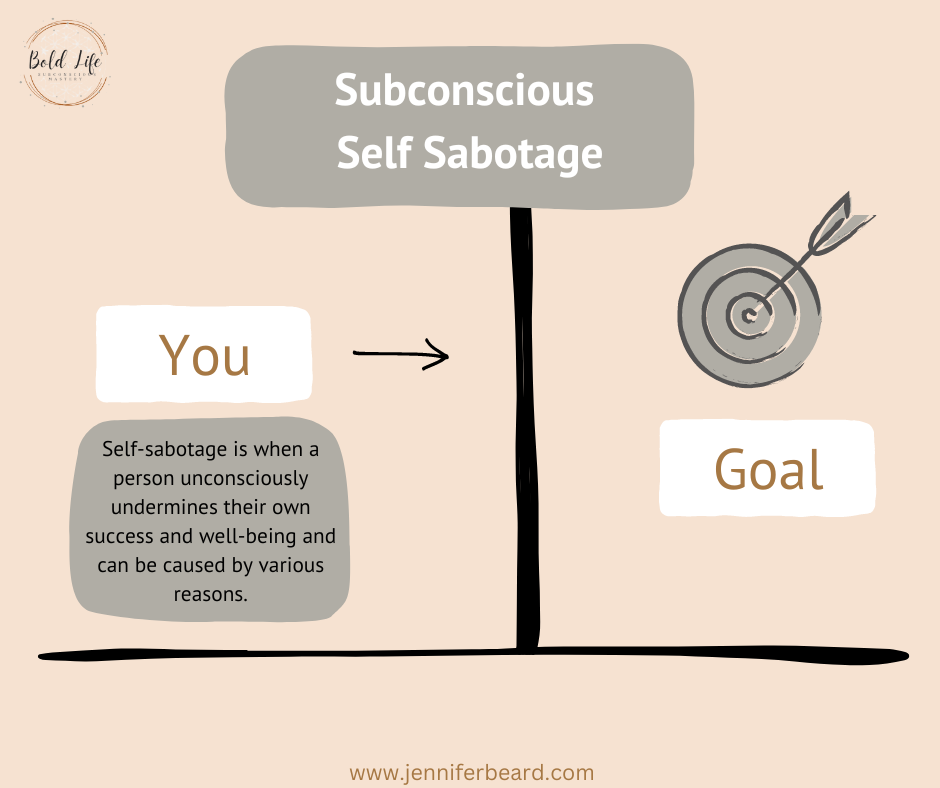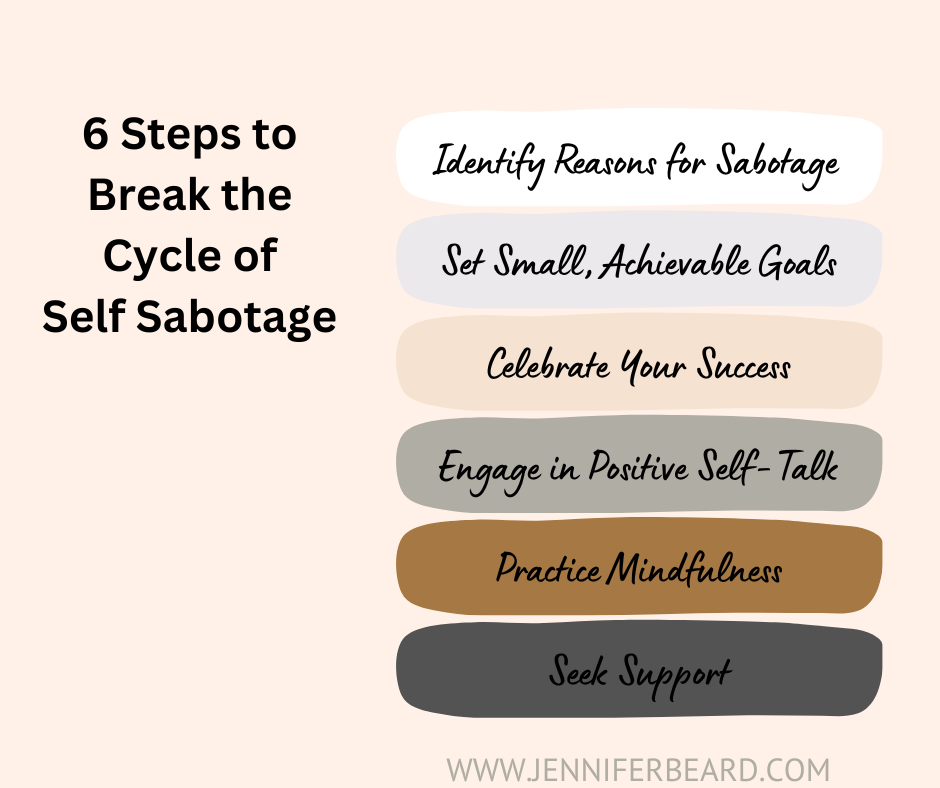Get the Guide
A simple, encouraging guide to help parents confidently transition into homeschooling, build a customized learning rhythm, and create a thriving educational experience at home.
Homeschooling 101 Starter Guide
Family
FAVE LINKS
Topics
Hi, I’m Jennifer — transformation coach, homeschooling mentor, and guide for parents ready to create a life that truly fits. I help you break through fear, align with your values, and confidently design both your child’s education and your own bold, authentic life.

Sometimes we self-sabotage just when things seem to be going smoothly. Perhaps this is a way to express our fear about whether it is okay for us to have a better life.
– Maureen Brady
Self sabotage is a ubiquitous topic these days. I hear the term tossed around social media platforms, in articles, and even on playdates with my son.
Although most people understand what self sabotage is, many don’t understand why it forms and what to do about it.
Self-sabotage, where a person unconsciously undermines their own success and well-being, can be caused by a variety of factors. Understanding these reasons is important for addressing and overcoming self-destructive behaviors.
First let’s identify if self sabotage is a factor with the following questions:
- Do you often find yourself close to success, only to make a mistake or give up at the last moment?
- Have you noticed recurring patterns where things don’t work out for reasons within your control?
- Do you avoid activities that would create the positive change you want or lead to benefits in your life?
It takes honesty and vulnerability to admit we aren’t moving forward in life. Often, we make choices that don’t support our overall well-being and although that sounds contradictory, there is a reason for it.

We create beliefs based on experiences that were stressful or traumatic.
These beliefs keep us from achieving goals, and ultimately, the life we desire.
I have a lot of empathy for when this happens to people.
We aren’t choosing limiting beliefs on purpose.
From the ages of 0 to 2 we don’t have the consciousness to choose at all. The beliefs come in through observation alone.
And from ages 3-7 there is an extremely limited ability to decide what meaning we give to events.
Here is an example:
Imagine a single mother of a five year old girl walks through the door. She had the worst day at work.
There was a problem and mom got blamed for it. Now, she’s wondering if she will even have a job the next morning.
As mom walks in the little girl comes running up to mom to give her a hug and nearly knocks her over.
Mom says in a tough tone, “What are you doing, trying to knock me down? You’re so clumsy!”
The little girl interpreted in that moment that she is clumsy and careless. Furthermore, she believes that this event means she isn’t worthy of love.
The child doesn’t realize the mother is taking her bad day out on her.
This is not a traumatic event, not even significant to the mom.
We understand that at a young age, it’s easy to misinterpret situations and develop limiting beliefs, and this often doesn’t improve significantly until adulthood.
Past the age of about nine, we had more control over what meaning we decided to give events. That didn’t mean, however, that we were aware of it.
During adolescence kids have more control over their interpretation, but it is a matter of taking responsibility.
Whether it is an adult or adolescent, realizing the moment of belief creation takes great awareness.
Besides, our own biology can affect our interpretation.
Humans have a propensity towards negativity which doesn’t assist us in creating positive beliefs. This bias is due to the history of humans and is a behavior passed down through our ancestry.
It was a protective mechanism, meant to keep us safe from the dangers of the world.
This means we will err on the side of negativity and naturally choose beliefs that don’t support us.
We can only avoid developing negative beliefs under unlikely conditions. A perfect human adult would have to guide us to adopt beneficial interpretations of every childhood situation.
The chance of this occurring is a resounding 0%. This means it is our responsibility to upgrade our negative beliefs, as we discover them.
In the meantime, here are a list of beliefs that we may have formed as a child or during stressful situations:
- Low Self-Esteem: It’s really tough when someone sees themselves in a negative light. They may not feel they deserve happiness or success, which can lead them to unknowingly push away chances that don’t match how they see themselves.
- Fear of Failure: The overwhelming worry about not succeeding can lead to self-sabotage. It’s a way to avoid the hurt of disappointment, by not letting themselves get too close to potential failure.
- Fear of Success: Strangely enough, success can be scary because of the new pressures and responsibilities it brings. Some might fear they can’t keep up with success or are anxious about how it might change their lives.
- Seeking Control: Sometimes, self-sabotage is about taking control. If failure seems unavoidable, a person might prefer to be the one dictating the terms of that failure.
- Comfort in Failure: For those who’ve often faced failure, its familiarity can be more comforting than the unknowns of success.
- Perfectionism: When perfectionists feel that their work doesn’t meet incredibly high standards, they might derail their own efforts, rather than face what they see as ‘imperfect’ results.
- Resistance to Change: Since success can lead to change, some might hold themselves back to keep things as they are, even if they desire more.
- Self-Punishment: In some cases, self-sabotage is a way of punishing oneself, often driven by feelings of guilt or unworthiness.
- Feeling Overwhelmed: Overwhelm from expectations or too much work can lead to self-sabotage as a way to lighten the load, even if it’s not in one’s best interest.
- Negative Beliefs: Deep-rooted negative beliefs about oneself or the world, often shaped by past experiences or upbringing, can lead to actions that stop success in its tracks.
Understanding these reasons for self-sabotage with empathy and self-compassion is crucial for overcoming such destructive patterns.
The first thing to do to break the cycle of self sabotage is to get a better understanding of why this is happening.
You may consider using these questions as journaling prompts so you can refer back to it.
10 Questions for Better Understanding
- Imagine you don’t change anything. What does your life (or your work) look like in three months?
- What do you think will happen if you continue on your current path? What are the long-term effects?
- How effective is your current approach? Is it getting you where you want to be?
- What opportunities might you be missing by sticking to your current strategy?
- What are the possible downsides if you don’t make any changes?
- How is your current situation impacting you and those around you, like colleagues or clients?
- If you keep going as you are now, where do you hope to end up? Is your current strategy aligned with this goal?
- How does your current approach affect your reputation and career prospects?
- How much longer are you willing to deal with the situation as it is?
- What kind of benefits or comfort are you getting from your current way of doing things?
Remember, breaking the pattern of self-sabotage is a process that takes time and effort. Be patient and kind to yourself as you work through these steps.

After you have a better understanding of the root causes, start moving forward.
Start with setting small, achievable goals and celebrating each success to build confidence.
Develope a positive self-talk routine, practice mindfulness, and seek support from friends, family, or professionals as needed.
In conclusion, overcoming self-sabotage is a journey of self-discovery and persistent effort.
By continuously applying these strategies with dedication and patience, one can forge a path towards lasting personal growth and fulfillment.
Take care,
Jennifer
p.s. Stay ahead of the game and join our community! Sign up for our weekly newsletter to get exclusive insights, tips, and strategies right in your inbox. Don’t miss out on the chance to elevate your journey every week.
Stay in touch!
Stay ahead of the game and join our community! Sign up for our weekly newsletter to get exclusive insights, tips, and strategies right in your inbox. Don’t miss out on the chance to elevate your journey every week.
Disclaimer: Please note that this article is intended to provide general information and inspiration. While it offers valuable insights, it’s essential to remember that it’s not a substitute for professional advice or therapy.
Productivity
Homeschooling
authenticity
intuition
BeLIEF CHANGE
Browse the categories
JenniferBeard.com 2025. All Rights Reserved.
17195 Silver Lake Parkway #136 Fenton, MI 48430 | PRIVACY | TERMS
Hi, I’m Jennifer — transformation coach, homeschooling mentor, and guide for those who are ready to create a life that truly fits. I help you break through fear, align with your values, and confidently design both your child’s education and your own bold, authentic life.
HAPPINESS STARTS
WITH YOU!
Get this practical guide for living a life of joy now!
Start homeschooling confidently
Get the homeschool guide
Check out our private coaching




Comments Off on 10 Questions to Destroy Self Sabotage